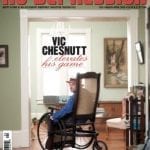Jimmy Lafave – Hard-core troubadour
“I’ve kind of rambled around every corner of America, and I still love doing it….I live on the road a lot, and observe a lot, and that’s what I like to write about. I want that to be my songwriting legacy.” Jimmy LaFave
Of the many traditions ingrained in America, few have had greater sustenance than the notion of striking out on the open road. From Jack Kerouac to Woody Guthrie and beyond, the idea that the country’s spirit can be found along rural landscapes seen from endless stretches of highway or railroad has long been part of the American consciousness. Jimmy LaFave believes emphatically in that tradition. On “Gotta Ramble”, the song that concludes his new album Blue Nightfall, he puts it thusly: “The highway calls, and then it sings/Makes my gypsy blood start to tingling.”
“On my website, on the tour page, I have the old ‘See America First’ logo,” says LaFave, who lives in Austin, Texas. “I think those commercials must have had an effect on me, when I was a little kid. I always love seeing America. If you read Woody Guthrie’s Bound For Glory, you get a sense of how there’s a whole country here to explore.
“I’ve kind of rambled around every corner of America, and I still love doing it. If someone says, ‘Hey, let’s go to Tahiti,’ or someplace like that, I’m like, ‘Nah, I’ll just go to the Black Hills, or ride through the Sand Hills of Nebraska.’ I live on the road a lot, and observe a lot, and that’s what I like to write about. I want that to be my songwriting legacy.”
Born in Wills Point, Texas, a small town about 50 miles east of Dallas, LaFave found his calling as a songwriter relatively early in life. Following a short stint playing drums, he got his first guitar — procured with S&H Green Stamps — when he was 14. Almost immediately he began writing songs, inspired by his mother’s collection of country music and by early 1970s AM radio.
The real turning point for him occurred, however, when his family relocated to Stillwater, Oklahoma, where he attended high school. “Moving to Oklahoma had this profound effect on my music,” LaFave says. “Stillwater really is a special kind of musical place. The people who come from there know what I’m talking about. I soaked up all the music that was there.”
LaFave also began nurturing a burgeoning reverence for one of Oklahoma’s most important native sons. “All of a sudden I was in the Woody Guthrie part of the country,” he explains. “When I was in high school, we used to go down to Okemah, where parts of Woody’s house were still standing, at that time. There was graffiti on the walls, from all the hobos who came from all over the world. That real rich Oklahoma musical tradition that comes from people like Woody Guthrie and J.J. Cale and Leon Russell influenced me a lot.”
After graduating from high school, LaFave remained in Stillwater for more than a decade, working odd jobs and playing small clubs throughout Oklahoma. For several years he was employed in his father’s business as a long-haul trucker, which took him all over the western part of the country. “That gave me long stretches of highway, to write songs,” he says. “I would take a little pocket recorder, and write as I drove.”
Meanwhile, inspired by the dedication and talent of the Texas-based artists who performed regularly in Stillwater, LaFave began making occasional pilgrimages to Austin. In 1986, he moved there.
“I kind of thought about moving to Nashville, but I just got caught up in the whole Austin thing,” he says. “It just seemed like a better fit, for me. It’s a great live music town, without the sort of business that can mess up the music, in a way. There’s plenty of honky-tonks and clubs and listening rooms around the hill country here. A lot of [performers] don’t even leave the city limits anymore. Some people might say that it’s impossible to make a living here, but if you have good, quality music, Austin’s the type of city that appreciates that. The cream really does rise to the top.”
After arriving in Austin, LaFave quickly secured a regular gig performing and hosting open-mike nights at the city’s now-defunct acoustic haven Chicago House. In 1988 he produced a self-financed tape titled Highway Angels…Full Moon Rain that won the Austin Chronicle Reader’s Poll “Tape of the Year” award. An ill-fated contract with Tomato Records prevented him from releasing an album for the next three years, but things took a better turn in 1991, when he met Bohemia Beat Records founder Mark Shumate.




